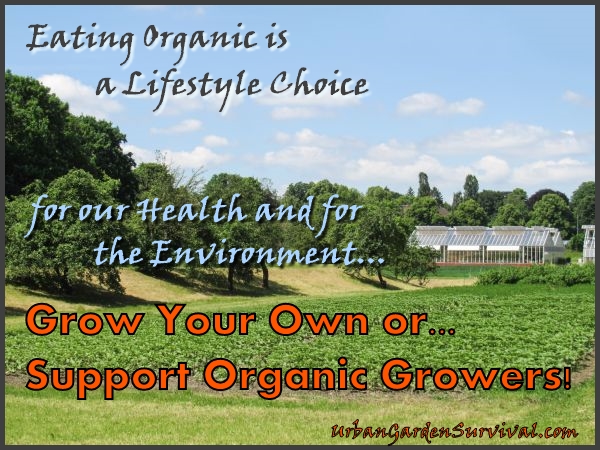Going Organic Series – Part 2
Below are eight reasons why you might want to start eating organic…
 In recent years ‘organic’ has become a bit of a buzz word… even a status symbol in some circles, but really that can undermine the most important reasons why we need to consider eating organic foods as much as possible if not totally.
In recent years ‘organic’ has become a bit of a buzz word… even a status symbol in some circles, but really that can undermine the most important reasons why we need to consider eating organic foods as much as possible if not totally.
Aside from the direct health benefits from the food itself, there’s the bigger picture, especially if you can actually start growing fresh organic produce for yourself.
It’s a way of life that takes us back to a more natural way of living and farming. One that has pretty much been destroyed by the machine and chemical infused food production industry which has become more the norm.
Of course we can all make the choices for ourselves, even though, sometimes financial and other constraints make the choices more difficult. There are however many ways we can make this ‘organic’ choice without it being too costly, in fact, it can even save us money, and we can usually grow something even if our available space is extremely limited.
Unfortunately, in the current world, there’s a lot of apathy; people sometimes choose to ‘stick their head in the sand’ because they would rather live in some sort of self-denial that there is really a problem and of course there are others who are just not aware of the extent and seriousness of the problem.
It’s possible that very few of us really appreciate the potentially positive impact on our lives, that can come from something as simply consuming only or mainly healthy food on a daily basis…
“Let food be thy medicine and medicine be thy food.” ~ Hippocrates
If you can appreciate why reducing chemicals and choosing healthier foods is so important, then hopefully, you will find some additional reasons here, to get started today!
Perhaps you are a little on the fence and are not totally sure exactly why going organic is worth it?

Organic eating has a number of benefits and here are just a few of them:
1. Eliminate or minimize the ingestion of chemical pesticides and fertilizers.
Even when you wash your fresh produce, it is impossible to remove all the harmful chemicals. Some of these chemicals are shown to affect your nervous system, cause cancer and many more health problems. Aside from the personal exposure to dangerous substances, there is also the environmental factors to consider. Conventional farming uses harmful chemicals which then contribute to the contamination of waterways, the soil and the air. By supporting organic, you are also supporting a cleaner environment.
Action Point: Consider getting rid of other chemicals in and around your home – look at safer options for cleaning products and other methods for eradicating pests.
2. Avoid irradiated food.
Irradiation of food is something that has been introduced to reduce spoilage of food, increase shelf life and destroy harmful pathogens that could cause health problems. Really it is something that has come about as a direct result of the farming practices that are predominantly responsible for delivering our food supplies… especially with importing and exporting produce.
The big problem with irradiation, as with pretty much everything we do to ‘avert’ the problems we cause from our ‘convenient’ food production methods, is that there is a dark side to this practice. There is virtually no evidence to suggest that irradiation does not have ill effects on our overall health, and from my point of view, there would be more reasons to support that it likely does have a negative impact, than not.
At the very least I would rather err on this side of the equation as not. What is known, is that the nutritional value of food is reduced… and when you consider that nutritional content is already less, just by the way most of our foods have been grown as well as how they are stored and processed, then the last thing we need is something else to make our food less beneficial.
Action Point: To avoid this… buy locally grown produce or grow your own! Support local organic growers and growers markets.
3. Get rid of GMO’s (Genetically Modified Organisms).
Clearly most of us are well aware that it is ‘money’ that makes the world go ’round, and if there stands to be some financial benefit, then really, the consequences to human health, to the health of our animals and the environment overall comes in second best. Of course huge companies, like Monsanto that have everything to gain from convincing us that there is no problem from the practices they promote. It is only when there is absolutely no option or that their ‘bottom line’ is adversly affected that they are motivated into removing what can be said to be harmful products and processes.
Much of Europe and Japan, have already banned the use of GMO foods… There is a lot of evidence to suggest that while there might be little observable short term problems, there are definitely long term dangers involved with regularly ingesting Genetically modified foods.
For me, this is another ‘no brainer’… Clearly, when we start meddling with things like DNA then we are asking for trouble, and I for one choose to band together with those who say ‘no to GMO foods‘. More and more of these are ‘creeping’ into our supermarkets and for the most part we remain unaware… Sadly the detrimental effects of these are likely to be attributed to other things, and will continue to be peddled to the public who remain ‘blissfully ignorant’ and will eventually bear the consequences.
Action Point: Buying organic means that you avoid GMO foods… so again, support local organic food producers.
4. Healthier Meat Products
While I believe given the overall condition of the environment, eating a Vegan diet it best, should you choose to continue to consume animal products, then it would clearly be better to ensure that these animals are as healthy as possible.
The more ‘natural’ the lives of the animals are, then the happier and healthier they are going to be. When livestock is kept organically, as well as when their slaughter is done in a more humane and thoughtful manner, then the end result will be healthier food products, whether that be meat, dairy or eggs. The animals that are kept in an Organic environment, are fed a diet that is more in keeping with their natural diet, rather than compounding the chemical contamination problem by feeding them chemically treated grains, overuse of antibiotics and added hormones.
Conventionally-raised livestock are routinely given hormones to help them grow faster, with antibiotics given en-masse for preventative measures, in an attempt to avoid illness. Unfortunately, due to the often poor lifestyle and hygieneic conditions in which these animals are kept, the use of these chemicals becomes almost necessary.
Organically raised animals are generally kept under much more humane and healthier conditions, much more akin to a ‘natural’ existence. When undertaken properly, this most often eliminates the need for using potentially harmful chemicals and practices that lead to less than healthy animals and hence less than healthy meat and food by-products. Consumers are at least avoiding ‘second-hand’ problems that can occur due to unhealthy animals.
Action Point: Find locally grown produce – often sold through Produce Markets or Organic Butchers and Organic Supermarkets.
5. Improved Environmental Factors
Without healthy soil we have nothing! The health of all living organisms whether, plant, animal or human depends on the health of air, water and soil.If the soil is depleted and contaminated, then no amount of clean air and water will help, so it is important that we look after the soil in a way that works with nature rather than us trying to ‘manipulate’ it for financial gain alone.
Organic growing and farming practices actually improve the health and quality of the soil which means that the food that we grow is going to have the best chance possible to be full of healthy nutrients and vitality. This benefits not only our own food crops, but the food crops of the food animals that are kept.
Many people don’t realize just how much our soils are depleted, and that we no longer get the nutrients we did from our foods just a few decades ago. In the US, for growers to obtain the certified organic label from the USDA, the soil must be free of prohibited chemicals for three years, and the same applies in Australia, in order to be certified organic or biodynamic produce.
Organic farming practices need to maintain and improve soil quality in order to achieve success as organic producers. You can learn more about soil health studies over at the Organic Trade Association.
Another positive environmental effect that’s frequently overlooked is the reduction of food transport by purchasing locally grown food or growing your own. Food transport contributes to carbon emissions and the use of natural resources in the form of fuels for traveling as well as refrigeration that is used in an effort to keep food as fresh as possible.
Action Point: Look for Certified Organic symbols on food you purchase, and get rid of any artificial fertilizers and non-organic chemicals in your garden when you grow your own fresh produce.
6. Wildlife Friendly
A healthy environment is attributed to an ecologically balanced one, and it is shown in a number of studies including one from Oxford University, that organic land management practices increase the biodiversity in both animal and plant species. This promotes overall a more beneficially healthy and well balanced eco-system.
Action Point: Consider transitioning over to organic growing practices if you are a grower, and if not then as I have mentioned previously, vote with your wallet, supporting the local Organic Growing Industry by purchasing organic produce and products.
7. Supporting the Local Economy.
Of course, I have pretty much labored this point throughout, however, it deserves specific mention, mainly because economic times are tough… as far as economic circumstances are concerned. Governments are finding it more and more challenging to support and maintain a healthy economical environment. When it comes down to it, we can all do our bit by supporting our local economies, simply by purchasing as much as possible items that are grown and made locally.
Clearly, this is a ‘win-win’ situation, because not only do the local businesses stand to do better, but you also get to benefit from fresher and if you choose organic, then also healthier food. You are also contributing to an improved local environment making the world a better place for yourself, your children and their children.
Action Point: Find out who your local suppliers are… Ask around local produce supply stores about local growers. Check out the local papers or news boards for information about Growers Markets. Do a search on Google for Organic food suppliers and producers and see what comes up…
To Finish Up…
Obviously, there’s lots of reasons why Going Organic is such a good idea, and I have only touched on a few in this article… Maybe I should have mentioned that Organic foods usually taste a whole lot better as well!
Perhaps you are thinking… it’s all well and good, but isn’t eating organically way too expensive? And depending on where you are living this might be a valid concern, however, in the next article I am going to cover ways you can ‘go organic’ and do it on a budget!
Keep a look out for Part 3 in the series…. “Budget Ideas for Organic Eating”
Leave a Reply